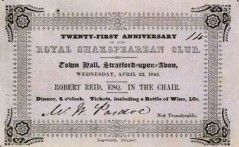  |
|
PROGRAMME DETAILS FOR THE 188TH SEASON 2011/2012
TUESDAY 10 JANUARY 2012
DR CLAIRE COCHRANE
Senior Lecturer in Drama and Performance at Worcester University
Dr Claire Cochrane both teaches and directs Shakespeare and other early modern drama. Her publications include Shakespeare and the Birmingham Repertory Theatre 1913-1929 (Society for Theatre Research, 1993) and Birmingham Rep: A City's Theatre 1962-2002 (Sir Barry Jackson Trust, 2003). Her new book Twentieth Century British Theatre Industry, Art and Empire will be published by Cambridge University Press in November.
Shakespeare in Modern Times: Birmingham Rep and the Shock of the New
The term 'repertory' as applied to a model of theatre that produces an eclectic selection of plays for its audiences has acquired a familiar, rather staid connotation in the hundred or so years since it was first introduced. At the beginning of the twentieth century, however, it represented all that was radical, high-minded and, above all, new about the work campaigning theatre artists such as Harley Granville Barker, George Bernard Shaw, William Poel and Edward Gordon Craig wanted to promote. As such it
was heavily influenced by European innovation, defiantly modernist and certainly capable of delivering shocks to traditional assumptions about what made effective theatre. The 'new' drama and the 'new' stagecraft helped create a 'new' Shakespeare. The Birmingham Repertory Theatre, opened by its founder Barry Jackson in 1913, maintained what was arguably a more consistently radical approach to Shakespeare's plays than could be seen anywhere else in the UK over the next two decades delivering the 'shock of the new' to frequently resistant audiences. This talk will explore the origins of the aesthetic principles which informed Birmingham Rep's approach to Shakespeare up until 1929 and discuss the impact of the most significant productions.
Lecture Notes
The 867th meeting of the Shakespeare Club took place at Mason Croft on Tuesday 10 January 2012. The meeting was chaired by Mary Reardon who introduced Dr Claire Cochrane, Senior Lecturer in Drama at the University of Worcester and author of two books on the Birmingham Repertory Theatre: Shakespeare and the Birmingham Repertory Theatre 1913-1929 and Birmingham Rep: A City’s Theatre 1962-2002, and the recently published Twentieth Century British Theatre: Industry, Art and Empire . Dr Cochrane drew on her research for her talk ‘Shakespeare in Modern Times: Birmingham Rep and the Shock of the New’.
Starting with the Rep’s 1928 production of Macbeth, set in the First World War, Dr Cochrane claimed this as the dramatic peak of the work of the Rep and its founder Sir Barry Jackson over three decades. Only ten years after the end of the Great War, audiences found its realism ‘too close to home’ and found uncomfortable anachronisms in the modern dress that distracted from the play. But at least one critic found that the modern-dress treatment of Shakespeare, that Jackson had first introduced to the world with Cymbeline in 1923, ‘scrubbed [the play] clean of dust and the varnish of ages’.
Dr Cochrane argued that between the wars (1918 to 1940) Birmingham Rep defiantly affiliated itself to the European Modernist movement, not always to the applause of its audiences in its home city and then later in London and on tour. She traced the life and influence of Sir Barry Jackson, the son of a Birmingham family that made its fortune in the dairy business, who founded the Rep in 1913 and the tensions between his claim that ‘art has no possible relation to money’ and the fact that he kept the theatre afloat for many years from his own pocket. In its choice of repertoire from absurdist drama like Jarry’s Ubu Roi to new plays by John Drinkwater, its introduction in the 20s of the latest trends in theatre design, using simplified stagings, drapes and tapestries, and the building in Station Street which, with its steeply-raked auditorium, could claim to be most radical theatre in England until the late 50s, Birmingham Rep was at the forefront of British theatre. The work of director H.K Ayliffe and young actors like Olivier, Gielgud, Ralph Richardson, Margaret Leighton and Gwen Ffrangcon-Davies secured its reputation in the UK and abroad.
After questions from the audience the meeting finished at 9pm.
CLICK TO GO BACK TO PAST EVENTS |




